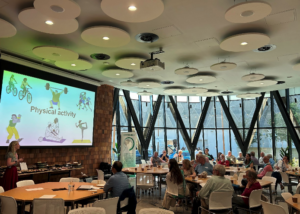The ActivDem project aims to identify psychological and social factors which support or prevent people with dementia from participating in everyday physical activity. Research findings will be used to develop strategies to support people with dementia to remain independent for longer following diagnosis. ActivDem is led by Dr Ríona Mc Ardle as part of her NIHR Advanced Fellowship, and is a collaboration with the DETERMIND study.
Why is everyday physical activity important for people with dementia?
Our population is living longer, leading to rising numbers of people developing dementia. People with dementia require significant care as the disease progresses, which may be stressful for themselves, their families and health and social care services. To reduce care needs, we need to ensure people with dementia can maintain their independence as long as possible.
Maintaining everyday physical activities may help people with dementia remain independent for longer. Everyday physical activity doesn’t have to be structured, like exercise, but can be any movement your body makes, such as going for a walk or doing housework and gardening. Everyday physical activity is more accessible to people with chronic health conditions or frailty, or to people who may not have access to exercise classes due to living rurally or in places that don’t provide those services. Staying physically active can help people preserve their ability to carry out daily tasks longer, and is associated with better memory and thinking, health, physical condition such as strength and fitness, and with socialisation.
However, even in early stages of dementia, people are less active than older adults without cognitive impairment. In a series of participatory workshops and interviews with people with dementia, carers and dementia professionals, Dr Mc Ardle heard about the importance of physical activity to people after their dementia diagnosis, with people explaining how loss of physical activity led to loss of independence, feelings of being a burden, greater risk of falls and frailty, loss of confidence and worse mental health. It was agreed that everyday physical activity after diagnosis is “crucial” to “keep people going”. These workshops and interviews also shone a light on the importance of carers when keeping people with dementia physically active. They explained that support for the carer is needed to help with this tasks, and suggested this can bring benefits to the carers also, saying “The more active the person with dementia is, the better it is for everyone”. These workshops helped Dr Mc Ardle develop three core research questions, which the ActivDem study aims to answer. These are:
How are the psychological and social experiences and traits of people with dementia and their carers associated with everyday physical activity decline in dementia?
How is social support and health and social care use associated with everyday physical activity decline in dementia?
Does decline in everyday physical activity reflect loss of independence in people with dementia?
To answer these questions, she linked with the DETERMIND study by adding ActivDem as a sub-study. This means that she will recruit up to 300 participants from DETERMIND to carry out a physical activity assessment/ In ActivDem, participants will be asked to undergo a physical activity assessment by wearing a small wearable device worn on their lower back for seven days. DETERMIND already ask numerous questionnaires on psychological and social traits and experiences, and on social networks and use of health and social care. This data will be used to answer the ActivDem research questions.
People with dementia are less physically active than older adults without dementia and this cannot be explained only by dementia-specific symptoms (e.g. memory and thinking difficulties).
I propose that psychological and social characteristics of both people with dementia and their carers (e.g. their ability to cope with their diagnosis, social support, mental wellbeing) may influence people with dementia’s abilities to maintain physical activity. By identifying the most influential characteristics, we can use this information to provide the best health and social care support available to people with dementia and their carers.
Change in everyday physical activity over time will be assessed, and the most influential characteristics for loss of physical activity will be identified using longitudinal statistical techniques. Following data analysis, Dr Mc Ardle will work with people with dementia, carers and dementia professionals to co-design an interventional design based on the evidence base and theory acquired during this study.







